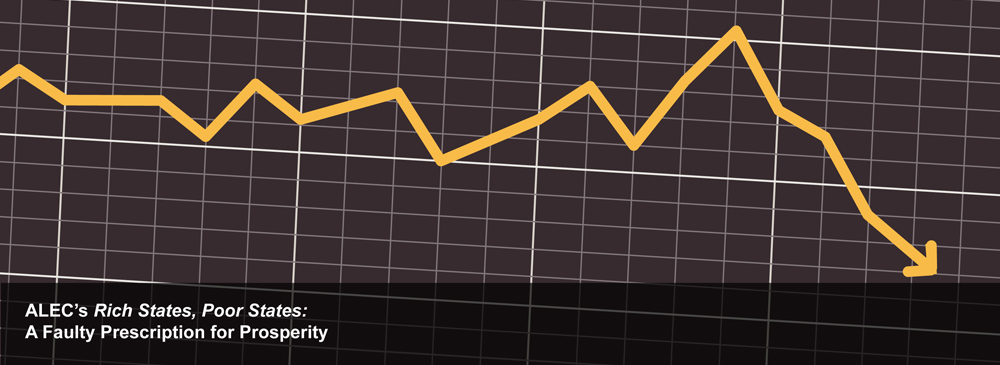The past decade has seen a proliferation of state rankings that purport to assess how states tax, regulate, and support business in a way that promotes state economic growth. Here we present the real story behind these state business climate rankings and explain how states can promote long term growth and broadly shared prosperity. Learn more about us
The Business Climate Rankings
The Larger Issues
ALEC'S RICH STATES, POOR STATES
The centerpiece of the American Legislative Exchange Council's Rich States, Poor States is the "Economic Outlook Ranking," which ranks states on their conformance to ALEC's policy agenda — cutting income taxes, reducing investments in education and other public services, low wages, weak unions — but is a poor predictor of prosperity and growth. Learn more
WHY BUSINESS CLIMATE RANKINGS SELDOM MAKE SENSE
While useful state rankings do exist, most prominent "business climate" rankings — cobbling together widely disparate, and often irrelevant, measures to construct an index number — are at best meaningless, and at worst a state ranking designed to make the case for policy positions advocated by the sponsoring organization. Learn more
THE TAX FOUNDATION'S STATE BUSINESS TAX CLIMATE INDEX
Combining more than 115 features of state tax law into a single index number produces a state ranking that turns out to bear very little relationship to what businesses actually pay in one state vs. another. Learn more
THE PROBLEM WITH TAX CUTTING AS ECONOMIC POLICY
Most business climate rankings view tax cuts as a central tool of state economic policy, but there are many problems with this approach. State and local taxes don’t have much impact on economic growth, and tax cuts can impede the public investments that actually play large roles. Learn more
OTHER BUSINESS CLIMATE RANKINGS
Rankings of state business climate or competitiveness have proliferated. Some are more defensible than others; some are a black box. Here are some of the more prominent attempts. Learn more
THE REAL PATH TO STATE PROSPERITY
The key to rising incomes and wages is increased productivity. States play an important role through investments in public infrastructure, in technological innovation at public universities and other institutions, and in workers through the education and training systems and through better health care. Learn more






